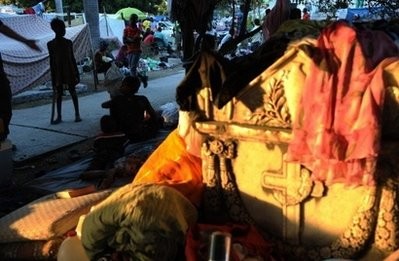Haitian officials launched a huge operation Thursday to move hundreds of thousands of homeless outside the ruined capital, as hopes dimmed of finding any more survivors beneath the rubble.
Medics treated the countless injured in makeshift hospitals as gangrene began to set in, and fresh looting broke out in devastated Port-au-Prince even as small signs of normal life returned nine days after the quake.
"It is difficult to work as before, but we're on course to regain control," President Rene Preval told reporters, countering charges that the government has been largely absent since the January 12 disaster.

Haircuts and gunfire as Haiti sputters back to life
Alongside the Haitian plan, French and US rescue workers have begun to clear debris and human waste from around the city's ceremonial square, the Champ de Mars, which has become a giant ad hoc refugee camp.
"We want to stop living like animals," said Carole Deslouis, who finally received the promise of food and shelter in the square Thursday after days of washing her children with filthy water and begging for rice.
Haiti quake victims find solidarity in chaos
US forces are also repairing the main port, hoping to slowly re-open it from Friday and bring in enough aid to feed people across the country, and brought in a temporary control tower for the country's overburdened main airport.
The government said it would try to relocate an estimated 500,000 left destitute by the 7.0-magnitude quake, moving them out of squalid, stinking bivouacs into temporary accommodation outside Port-au-Prince.
"The government has made available to people free transportation. A large operation is taking place: we're in the process of relocating homeless people," said Interior Minister Paul Antoine Bien-Aime.
The government will hire some 34 buses to take quake victims to the south and north of the Caribbean nation to hastily set up villages designed to hold 10,000 people each, and work with local mayors to identify sites.
Rescue teams from around the world still combed the debris for survivors in and around Port-au-Prince, after two children were miraculously rescued alive on Wednesday, but Thursday brought no new signs of life from beneath the silent debris.
'Don't leave me Mama,' cries Haiti girl, alive eight days on
Those pulled from the rubble still faced a desperate fight for survival.
Around two dozen orphans, adopted by French families, were due to be flown out of the city later Thursday, despite concerns from children's aid groups that fast-track procedures could lead to families being broken up forever.
Tens of thousands of Haitians remain seriously wounded in makeshift field hospitals set up in tents on the ruins of the ravaged capital.
International doctors, working in miserable conditions lacking supplies and modern equipment, have carried out scores of amputations to save victims with serious crush wounds or repair internal injuries.
Haitians nurse injuries in border town, cut off from family
A 1,000-bed capacity US naval hospital ship is moored off Haiti with about 800 medical personnel and has begun taking the worst of the injured.
The International Organization for Migration estimated Thursday that at least half a million people are now living outdoors in improvised camps, and warned the number was climbing as people flood in from damaged villages.
Thousands of US troops have poured into Haiti with a total of 20,000 expected on the ground or offshore by Sunday. Other nations have pledged security forces to help distribute aid, provide medical treatment and keep the streets secure from looters.
The World Bank said it would waive Haiti's debt payments for the next five years due to the devastation, and study efforts to cancel the nation's remaining debt of about 38 million dollars.
A street in the capital was shut down Thursday to allow hundreds of Haitians to make deposits and withdraw money from an impromptu teller set up by the Central Bank of Haiti (BRH).
Haitians rush for cash as bank re-opens
"I don't have any more cash, and I can't borrow money from my friends because they are in the same situation," said Renee Lafortune, a nurse.
Prices have soared on the streets amid general shortages. Anyone who managed to stash extra food, petrol or cigarettes can now get rich, quick.
"I had several cans of gasoline at home for a factory on my property and I have been selling them little by little," said Ludovic. "It's 400 Haitian gourdes, no haggling," he said, pricing a can at twice what it fetched before the quake.
Haiti quake is big business for some
Meanwhile, a meeting of government ministers was interrupted by a 4.8-magnitude aftershock, the latest in a series of tremors in recent days that have tested the shattered nerves of survivors.
World powers will discuss plans to rebuild the country at a major donor conference on Monday in Montreal.
























